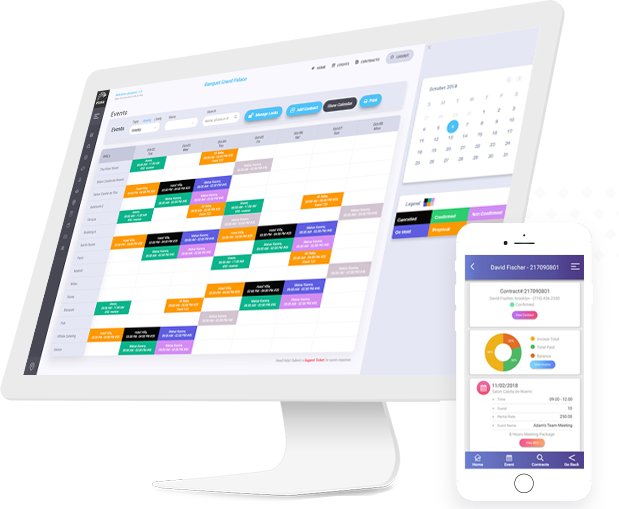The digital landscape today is evolving at a pace that is unpredictable in nature and having to stay ahead of the curve is not just a necessary. Businesses and institutions have to be sure that they invest in Learning Management Solutions (LMS), that is not only functional but also scalable. In order to make sure of that, it is essential that your learning system remain adaptable, and ready for future demands and thereby allowing your organization to expand without having to go through any of the technological limitations.
The two major significant factors that needs to be considered while choosing your learning management system provider are scalability and customisation. This is because these features allow you to grow the efficiency and effectiveness of platform even if there is a difference in the size, goals or operational requirements of the organisation.
Curious to know how LMS development contributes to the success of the organisation? Here in this blog, we explore how scalability is a key factor in LMS development and how it contributes to the success of a successful LMS application.
What is Scalability in LMS Development?
Scalability makes sure that your Learning Management System can handle more users, courses and features smoothly. It makes sure that as the companies grow, their LMS also can accommodate with it. A well-designed learning system can work for both small and big companies with tools that can ensure that it is easy as well as fun for the learners to handle it.
The Importance of Scalability in LMS Development
1. Meeting the Growing Demand for Online Learning
With the global e-learning market growing faster than ever before, it is expected to reach new heights especially with it being driven by corporate training programs and academic institutions courses. An LMS should be able to handle this growth without crashing down or slowing down. Because only a system that is capable of scalability can makes sure of a smooth success for all of its users, not matter how many are online at once.
2. Adapting to Organizational Growth
Organizations start small but expand over time. A scalable LMS makes it easy to add more learners, teachers, and courses without major system changes. Without this, businesses may face expensive upgrades or even have to switch platforms.
3. Supporting Advanced Features and Integrations
Today LMS platforms are more than just platforms for course delivery, they must also offer integration with tools that handle customer relationship management (CRM) systems, HR systems, analytics, and automation software. A scalable LMS allows these features to be added easily without slowing down or causing errors.
4. Enhancing User Experience
A slow and unresponsive LMS can frustrate students and teachers, which could result in low engagement rates and reduced effectiveness of the learning program. Scalability keeps the platform fast and responsive, whether users are streaming videos, attending live classes, or accessing large files.
5. Cost Efficiency and Long-Term Sustainability
Investing in a scalable LMS helps organizations avoid costly upgrades and downtime. A system that grows with them ensures smooth operations, fewer maintenance costs, and uninterrupted learning, making it a smart and budget-friendly choice.
Key Considerations for a Scalable LMS Application
-
Cloud-Based System
A cloud based LMS can automatically adjust itself to handle the growth as well as the shrink without the need for manual updates. Unlike traditional systems that need constant upgrades, a cloud LMS adjusts automatically, keeping things fast and cost-effective.
-
Flexible Design
A modular LMS lets organizations add new features without changing the whole system. This means they can easily include things like AI tools, gamification, or extra learning resources without affecting current users.
-
Smooth Performance
In order to prevent crashes and slowing down of the performance, a scalable LMS spreads out traffic evenly. It also uses smart technology like caching to keep things running smoothly, even when thousands of people are online at once.
-
Supports Multiple User Groups
Some organizations need separate learning spaces for different teams, schools, or business clients. A multi-tenant LMS allows each group to have its own setup while still using a shared system, making learning more personalized and efficient.
-
Strong Security and Compliance
As more people use an LMS, protecting their data becomes even more important. A scalable system should have strong security, follow industry rules, and use safe login methods to keep user information secure.
Scalability is not just an added advantage in LMS development—it is a necessity. A scalable learning management software enables organizations to accommodate growth, support diverse learning needs, and integrate advanced technologies without compromising performance. By prioritizing cloud infrastructure, modular design, and performance optimization, businesses and educational institutions can build a future-proof LMS application that adapts to changing demands and delivers an exceptional learning experience.
As online learning continues to expand, investing in a scalable LMS ensures that your organization remains competitive, innovative, and ready for the future of education. We at Veuz Concepts can help you guide towards your first e-learning platform. Whether you are developing a corporate training platform or an academic e-learning system, scalability should be at the core of your LMS strategy. Book a consultation with Veuz Concepts today to learn more about our Learning management services and find out which ones are the best fit for your business.









.jpg )







Leave a comment